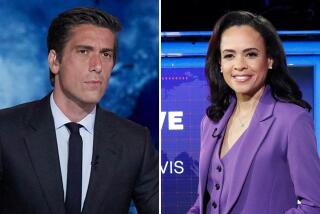Impartial, dignified, classy: Ifill was the perfect referee
At least one figure on the stage for Thursday night’s vice presidential debate reached a high standard for reason, fairness and class.
Gwen Ifill of PBS demonstrated abundant dignity as referee of the much-anticipated debate between Sarah Palin and Joe Biden.
The veteran newswoman lived up, in every sense, to her title: moderator. She directed the candidates to important topics, pushed to keep them on subject and betrayed no favoritism.
Some partisan critics had suggested in recent days that Ifill was unfit for the role because she is writing a book about American politics in the “age of Obama.” As in Barack Obama, the Democratic presidential nominee.
That information sent conservative commentators like Richard Viguerie into convulsions of dismay and anger. Surely, Ifill was a liberal plant who would try to tilt the debate toward Biden, the Democratic senator from Delaware.
Viguerie said Wednesday that Democrats would agree to debates only where they got “the home-field advantage, only when the questioners are people who see liberalism as objective reality and who consider the opinions of conservative, mainstream Americans to be backward and ill-informed.”
If those were Ifill’s feelings, she sure kept them concealed. One measure of how well the former newspaper reporter performed was that, once the talking started, she faded into the background as Biden and Palin shared their strikingly different world views.
I’d defy the critics to show how Ifill’s questions even came close to favoring one nominee over the other.
When she asked about taxes, for example, both nominees faced a pointed inquiry. To Biden: Isn’t the Democrats’ call to tax the wealthy an invitation to class warfare? To Palin: Couldn’t McCain’s proposal to tax health insurance benefits cost many Americans their current coverage?
When the GOP governor of Alaska’s answer focused mostly on dubbing Obama a big-time tax-and-spender, Ifill helpfully reminded Palin that she needed to respond to the query about McCain’s health insurance proposal.
Both nominees segued far afield on a question about just what they would do in the vice president’s office, and Ifill gave both a gentle scolding.
“Governor, senator, neither of you really answered that last question about what you would do as vice president,” Ifill said, to laughter from the audience. “I’m going to come back to that throughout the evening to try to see if we can look forward as well.”
And she did.
What the critics who set out to pillory Ifill failed to acknowledge -- because it did not suit their political aims -- was that real journalists, who doubtless have biases, can and will put them aside to do their jobs.
And the 53-year-old journalist is a real professional, one who has covered the White House, Congress and presidential campaigns for four newspapers, including the New York Times and the Washington Post.
Her upcoming book, “Breakthrough: Politics and Race in the Age of Obama,” will feature three other politicians along with the Democratic presidential candidate.
Journalists and commentators are perfectly justified in pointing out that Ifill is writing the book. And voters can judge for themselves whether that project swayed her to help Obama’s running mate or to throw obstacles in front of his Republican rival.
Ifill answered those questions admirably, showing that, regardless of her personal feelings, she knows how to moderate a serious political discussion. And how to fade gracefully into the background -- something her loud critics, who assumed the worst, should think about doing.
--
More to Read
Get the L.A. Times Politics newsletter
Deeply reported insights into legislation, politics and policy from Sacramento, Washington and beyond. In your inbox three times per week.
You may occasionally receive promotional content from the Los Angeles Times.











